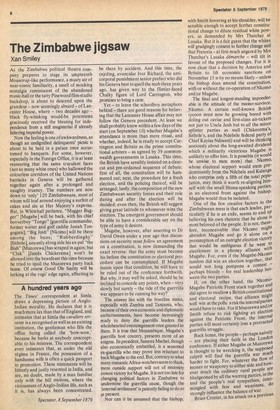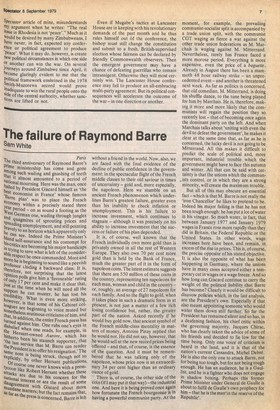The Zimbabwe jigsaw
Xan Smiley
As the Zimbabwe political theatre company prepares to stage its umpteenth Mousetrap-like performance, a musty air of near-comic familiarity, a smell of mocking nostalgia reminiscent of the abandoned music-hall or the tatty Pinewood film-studio backdrop, is about to descend upon the grandeur — now seemingly absurd — of Lancaster House, where — two decades ago — black fly-whisking would-be potentates graciously received the blessing for independence from a still magisterial if already faltering imperial power.
Now the feeling is one of awkwardness, as though an undignified delinquents' picnic is about to be held in a palace once accustomed to banquets. For some, however, especially in the Foreign Office, it is at least reassuring that the same truculent faces (not so many white ones) who hallowed the colourless corridors of the United Nations barracks in Geneva will be gathered together again after a prolonged and naughty truancy. The numbers are now down to 'only' 120 Zimbabweans, most of whom will loaf around enjoying a surfeit of cakes and ale at Her Majesty's expense. But, in Whitehall parlance, "Mugger Bugger" [Mugabe] will be back, with his chief bovverboy "Tongo" [guerrilla commander, former waiter and golf caddie Josiah Tongogara]; "Big Josh" [Nkomo] will be there among the buns; "Rubberdinghy" [Sitholej, uneasily along side his ex-pal "the Dish" [Muzorewa] has scraped in again; but "Chik" [James Chickerema] won't be allowed into the beanfeast this time because he tried to spoil the Muzorewa party back home. Of course. Good Ole Smitty will be lurking at the rugs' edge again, affecting to be there by accident. And this time, the cajoling, avuncular Ivor Richard, the anticorporal punishment senior prefect who did his Geneva best to quell the mob three years ago, has given way to the flintier-faced Chalky figure of Lord Carrington, who promises to bring a cane.
Yet — to leave the schoolboy metaphors behind — there are good reasons for believing that the Lancaster House affair may not follow the Geneva precedent. At least we shall probably know within a few days of the start (on September 10) whether Mugabe's attendance is more than mere ritual, and whether, indeed, he is ready to accept Carrington and Britain as the prime constitutional arbiters — as agreed by 39 commonwealth governments in Lusaka. This time, the British have sensibly insisted on a clearcut and pre-ordained sequence of debate: first of all, the constitution will be hammered out; next, the procedure for a fresh election, and the policing thereof, will be arranged; lastly, the composition of the new Zimbabwean security forces and their role during and after the election will be decided: even then, the British will suggest giving great latitude to whomever wins the election. The emergent government should be able to have a considerable say on the type of army it desires.
Mugabe, however, after asserting to Dr David Owen under a year ago that discussions on security must follow an agreement on a constitution, is now demanding the exact reverse: that the army must become his before the constitution or electoral procedure can be contemplated. If Mugabe insists upon that condition, he will have to be ruled out of the conference forthwith. But why, it may well be asked, should he be inclined to concede any points, when — very slowly but surely — the tide of the guerrilla war appears to be running his way?
The answer lies with the frontline states, especially with Zambia and Tanzania, who, because of their own economic and diplomatic embarrassments, have become increasingly ready to deny the guerrilla leaders the wholehearted encouragement once granted to them. It is true that Mozambique, Mugabe's guerrilla host country, presents more of an enigma. Its president, Samora Machel, though also economically embattled, is a seasoned ex-guerrilla who may prove less reluctant to back Mugabe to the end. But, contrary to what many romantic Africa-watchers seem to think, mere outside support will not of necessity ensure victory for Mugabe. It is not too late for changing political factors in Zimbabwe to undermine the guerrilla cause, though the 'internal settlement' is patently failing to do so at present.
Nor can it be assumed that the bishop, with Smith hovering at his shoulder, will be sensible enough to accept further constitutional change to dilute residual white powers, as demanded by Mrs Thatcher at Lusaka. But it is a fair guess that the whites will grudgingly consent to further change and that Pretoria — at first much angered by Mrs Thatcher's Lusaka demarche — will tilt in favour of the proposed changes. For it is now clear that a decision by America and Britain to lift economic sanctions on November 15 is by no means likely — unless the bishop does amend the constitution, with or without the co-operation of Nkomo and/or Mugabe.
The final and longest-standing imponderable is the attitude of the master-survivor, Nkomo. A certain well-known British tycoon must now be growing bored with doling out caviar and first-class air-tickets not just to Uncle Josh but to all the minor splinter parties as well (Chikerema's, Sithole's, and the Ndebele federal party of Chief Kayisa Ndiweni) and will be thinking anxiously about the long-awaited dividend which a militarily victorious Mugabe is unlikely to offer him. It is possible (it would be unwise to state more) that Nkomo, whose electoral support would stem predominantly from the Ndebele and Kalanga who comprise only a fifth of the total population, may think it worth re-aligning himself with the small Shona-speaking parties, in an electoral front against the bishop. Mugabe would thus be isolated. One of the few creative factors in the Zimbabwean mess is that each leader, particularly if he is an exile, seems to end up believing his own rhetoric that he alone is most beloved of the people. It is not, therefore, inconceivable that Nkomo might abandon Mugabe and go it alone on a presumption of an outright election victory that would be ambiguous if he were ,to electioneer in a phoney alliance with Mugabe. For, even if the Mugabe-Nkomo tandem did win an election together, that would not long postpone a contest — perhaps bloody — for real leadership between the two parties. If, on the other hand, the Nkomo Mugabe Patriotic Front stuck together and did agree to swallow a British constitutional and electoral recipe, that alliance might well win at the polls: a risk the internal parties would have to take. For if Muzorewa and/or Smith refuse to risk fighting an election against the Patriotic Front, the internal parties will most certainly lose a protracted guerrilla struggle. Back home, the people — perhaps naively — are placing their faith in the London conference. If either Mugabe or Muzorewa is thought to be wrecking it, the supposed culprit will find the guerrilla war much harder to fight. For, whatever the flow of money or weaponry to either side and however much the ordinary rural people are bludgeoned by all the warring parties, in the end the people's real sympathies, intermingled with fear and weariness, do strongly influence the balance of war, Brian Crozier, in his attack on a previous SPectator article of mine, misunderstands my argument when he writes: "The real Issue in Rhodesia is not 'peace'." Much as it would be desired by many Zimbabweans, I have never, in fact, expected any confer!nee or political agreement to produce Peace'. What it may do, however, is create new political circumstances in which one side or another can win the war. On several Journeys around Zimbabwe since April, it became glaringly evident to me that the Political framework enshrined in the 1978 triith-Muzorewa accord would prove Inadequate to win the rural people onto the Side of the central authority, whether sanctions are lifted or not. Even if Mugabe's tactics at Lancaster House are in keeping with his revolutionary demands of the past month and he thus rules himself out of the conference, the bishop must still change the constitution and submit to a fresh, British-supervised election whose fairness can be declared by friendly Commonwealth observers. Then the emergent government may have a chance of defeating guerrillas who remain intransigent. Otherwise they will most certainly win. The Lancaster House conference may fail to produce an all-embracing multi-party agreement. But its political consequences will accelerate the outcome of the war in one direction or another.



































 Previous page
Previous page